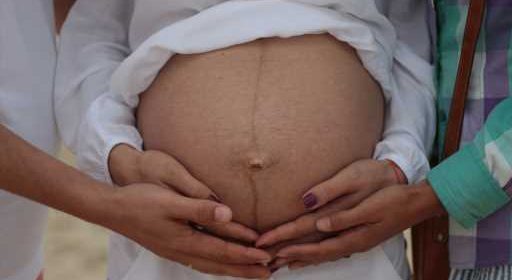Surrogate Still Caring For Baby 9 Months Later Due to COVID Travel Restrictions

Among the many stories of lives interrupted by the pandemic, it’s hard to top the many coming from people who were just about to make their family dreams come true before the world went haywire last year. In addition to fertility treatments put on hold, there have been families separated from their babies delivered by surrogate, and others waiting up to a year to bring home children they’ve been planning to adopt from overseas.
One of the most astonishing of these stories: An Idaho surrogate carrier is still caring for the baby she gave birth to almost a year ago after COVID-19 restrictions prevented the intended parents from flying from China to pick up their baby girl. According to Idaho News 6, Emily Chrislip was carrying the biological child of a couple living in China when the pandemic first began. Because of the travel restrictions that immediately rolled out following the early surges of the pandemic in 2020, the parents had to miss the birth of their child.
https://www.instagram.com/p/CLwqE1MHh_9/
A post shared by Emily Chrislip (@emilychrislip)
Chrislip and her husband were understanding, and agreed to take care of the child for the initial four week lockdown, but nine months later, the Chrislips are still caring for the baby. “The biggest concern is the restrictions,” she explained to News 6. “I don’t think they’ll have a problem getting to the U.S., but getting back into Asia, they might have problems. So we’re trying to wait and see what happens with all the restrictions.”
In an earlier report from CTVNews, Chrislip explained that the father, who is a Canadian citizen, had been trying to secure a Canadian passport for the baby’s mother so that they could travel into the country through the Canadian border.
According to Chrislip, the process for the family to fly to the U.S. to pick up their daughter can take up to three months due to quarantine and restrictions at the various ports of entry along their way, which is just one of the reasons they haven’t been able to make the trip.
“I just don’t know if they can take that amount of time off of work,” she said. “I know some people would be like, ‘Well, it’s their child,’ but for us too. My husband and I have talked about it and our job is our livelihood, and that’s how we pay for things, so we have to work around that for ourselves too.”
During her interview, Chrislip said that the hardest part of all of his will be adjusting back to life without the baby. She added that she is grateful to have had the opportunity to care for the baby though, who would’ve otherwise gone to a nanny agency while the logistics of travel were sorted out.
“Looking back I’m like, ‘holy cow nine months is a long time,’” she told News 6. “But it seems like it’s gone very fast, so it’s different when you sit down and think about the situation, but on a day-to-day basis, we just get through it and keep going on about our day and so it doesn’t seem too out of the ordinary anymore.” We admire her positivity, but we have so many questions. How did they get a nursery set up so quickly? Who is footing the bill for all of the additional care? How is Chrislip going to adjust to life after the baby leaves? And the poor intended parents, how are they coping with having a nine month old they’ve never held?
International adoptions delayed
Chrislip and the parents she carried a baby for are hardly the only growing family separated by the pandemic. In an essay appearing in The Washington Post, Jackie Spinner wrote about the process of adopting from Morocco when the pandemic hit.
Sameena Gulamali and Jauher Ahmad were in the process of adopting toddler twins when the border shut down, according to Spinner.
“You can imagine how devastated we were when we heard the news,” Gulamali told her. “Once the borders closed, my every waking moment was consumed with thoughts of my babies and how I could bring them home. Days quickly turned to weeks and weeks into months.” The pair wouldn’t be able to reach their twins until nearly a year after they first met them.
For Spinner, the COVID restrictions interrupted her planned March 2020 trip to meet the little boy she’d fallen in love with via photos and videos sent from the same orphanage.
“With most global travel halted last year and restrictions still in place in some countries even now, many families adopting from overseas have been stuck in anguished suspense,” she wrote. “Those fortunate enough to travel after being in limbo for months have faced costly increases to carefully budgeted trips, new testing and quarantining procedures, and the apprehension of traveling in a deadly pandemic that has killed more than 2.5 million people worldwide.”
Spinner noted that the legality of it all adds another layer of complication, since U.S. adoption approvals have expired in a lot of cases, leading to nightmarishly expensive and time-consuming renewal processes. Fortunately, Spinner has been able to return to the U.S. with her son since restrictions have begun to lift.
As for the biological parents of the baby Chrislip still cares for, they’ve been getting regular updates through FaceTime calls and pictures. Both families hope that they will be able to unite prior to the baby’s approaching May 18 birthday. And we hope so, too!
Childbirth is nothing like in the movies, as these beautiful photos show.
Source: Read Full Article

